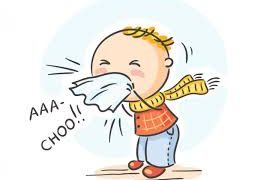GREAT BAY, Sint Maarten (DCOMM) – It’s that time of the year when influenza, better known as the flu, becomes more predominant.
Influenza is a highly contagious viral infection. Unlike the common cold, influenza can cause severe illness and life-threatening complications such as pneumonia and bronchitis, which often require hospitalization.
The flu poses a risk or can be especially dangerous for certain groups such as the elderly (65-years and over), pregnant women, and very young children (aged six months and over) as well as for people with underlying medical conditions known as immunocompromised (such as severe asthma, lung or heart disease, low immunity, diabetics).
The aforementioned groups are considered high-risk groups and it is highly recommended that these persons get their flu shot (vaccine), advises the Collective Prevention Service (CPS), a department within the Ministry of Public Health, Social Development and Labour (Ministry VSA).
A representative from Section General Health Care (SGHC) from Ministry VSA, recently attended the Pan American Health Organization (PAHO) ‘Sub-Regional Influenza Surveillance Meeting and Pandemic Preparedness and Response training,’ in Montego, Jamaica.
PAHO has urged Member States who attended the workshop to update their respective National Influenza Plan and to take the necessary measures to ensure timely surveillance, proper clinical management, ensure strict adherence to infection prevention control measures in health care services, provide adequate supplies of antivirals and prevention, and provide timely treatment of complications.
Based on the outcome of the workshop that brought together more than 30 countries from the Region, SGHC has drafted a plan of action on what steps need to be taken internally annually to ensure that guidelines, reporting and surveillance requirements and protocols are up-to-date and in line with international health regulations.
With respect to flu-prevention guidance, the vaccination offers effective protection against influenza. Persons are also reminded to adhere to proper handwashing and cough etiquettes. Vaccines need to be given each year as flu viruses are always changing.
Influenza spreads from an infected person to others through the air by droplets (secretion) as a result of coughing and/or sneezing, or by direct contact with the virus on hard surfaces or people’s hands that have the viruses on them then touching the mouth, nose or eyes.
The flu usually differs from a cold as symptoms develop suddenly and can lead to complications such as chest infections and pneumonia – particularly among the elderly and young children.
Flu symptoms tend to develop abruptly one to three days after infection, and can include: tiredness, high fever, chills, headache, coughing, sneezing, runny noses, poor appetite, and muscle aches.
Most people who get the flu will suffer from mild illness and will recover in less than two weeks. However, some people can develop longer-term health problems, including pneumonia, bronchitis, chest and sinus infections, heart, blood system or liver complications, which can lead to hospitalisation and even death.
As adults consult your physician to assure the correct information as it relates to your vaccination and your health diagnosis, to obtain laboratory confirmation of the condition and acquire treatment for respective condition.
According to CPS, let us prevent the spread or increase of influenza cases by: Wash your hands often with soap and water for at least 20 seconds; Avoid touching their eyes, nose, or mouth with unwashed hands.
Avoid close contact with people who are sick. Patients who have cold-like symptoms should cover their mouth and nose when coughing and sneezing and wash their hands frequently and correctly (with soap and water for at least 20 seconds).
Avoid sharing cups and eating utensils with others and refrain from kissing others and stay at home when your sick.


















